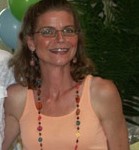 The eulogy I gave for my sister, Beth Geichman Clemmer, on April 15, 2012:
The eulogy I gave for my sister, Beth Geichman Clemmer, on April 15, 2012:
If you knew Beth and you’re like me, you think of her as quiet, reserved, maybe even kind of shy. She certainly was never one to want to draw attention to herself.
So, it might surprise you to hear that her life started with a crash. By that I mean that during the first and, I think, last real birthday party we put on for my father—with Mom and Dad’s friends coming over and enjoying adult beverages and hors d’oeuvres served on Ritz crackers, which, of course, was the height of casual partying in the late 1960s—Beth crashed the party when Mom went into labor. I remember watching my mother as she sat on the edge of her bed wondering if this was it. And it was, and the party ended rather abruptly.
One of my parents’ friends stayed overnight with Mike and me while Dad and Mom went to the hospital to get our little sister. I was eight years old and so excited the morning Mom and Dad and Beth were to arrive home that I threw up all over the hallway. Avocado carpeting christened with milky breakfast. Some things you just never forget.
I was the big sister and should have set the example, but it was Beth who helped me learn years later what being a protective and caring sister really means.
In 2002, Beth, Dad, and I took an August trip to Tucson. Now, August isn’t a great time to travel to Arizona. It’s monsoon season, when the average daily temperature rises to the upper 90s and the sometimes-daily downpours can make it seem much hotter. But I had a business conference to attend and asked if Dad and Beth would like to go. And since they both loved to travel, they jumped at the chance.
I, on the other hand, didn’t like traveling so much. Flying terrified me. The season’s violent storms moving from the southwestern states up to Ohio heightened my fears because we had to fly right over and sometimes through those storms. The plane tossed and felt like it was being bounced from one side of the sky to the other. Beth knew I was scared, and she held my hand. I didn’t realize how hard I was squeezing her until she disengaged for a moment and shook out the pain. And she had to do that several times. She later said I was squeezing so hard that I cut off her circulation. But, every time, she enthusiastically offered me her hand again. No words. Just an outstretched palm that made me feel calm and protected.
Beth radiated excitement about our trip. She looked out the plane’s window, watching the ground when it was visible and at other times staring straight into the storm. She wasn’t at all afraid of the challenge.
As I watched my sister, I remembered that Beth and I had a secret. It was just a few days before this trip commenced that she’d had scans and a biopsy because the doctor suspected cancer. As always, Beth thought more about others than herself. She asked me to keep her secret so as not to unduly worry the rest of the family. After all, what if it turned out to be nothing?
As I sat there on that bumpy plane watching Beth stare into the storm, knowing what storm she may have to come to face, realizing that my little sister was braver than I, I still had no idea how brave she could and would be.
As Beth confirmed later, I happened to walk through the lobby of the resort where we were staying as she was on the phone getting the diagnosis. She indeed had cancer. She wasn’t crying. She didn’t even look upset. When she saw me watching her, she turned away to shield me from the news.
We went through the rest of the trip as though nothing was wrong. We even visited Tombstone, walked through Boothill Graveyard where famous and infamous cowboys lay, and talked about my childhood fantasies of being a wild outlaw. Beth never let the specter of cancer mar her journey, or ours. She was all smiles, as usual. Bright, happy Beth.
The morning we were leaving the resort and Dad was downstairs putting our luggage in the rental car to take us back to the airport to another scary plane, Beth turned to me and asked, “Can you keep a secret?”
“Yes,” I whispered, fearing what she’d say.
And then she said it. “I have cancer.”
I grabbed Beth and hugged her, and she hugged back. And, when Beth hugged you, you knew you were being hugged. She put her whole self into it.
As we held each other and I tried to hold back tears, Beth said, “I’m gonna beat this. I’m gonna beat this.”
And she did. She beat cancer. She never let it get the better of her.
Cancer tries to take away everything. All the light in someone’s life. All the hope and future, right from the very start. It offers its dark grizzly hand and says, “It’s over.”
But Beth didn’t buy that. She courageously went through surgery and chemotherapy treatments to fight off the invader. Throughout it all she maintained a positive outlook—up until the very end, even when she knew she was going to die. She refused to look at the dark side. She beat cancer for ten productive, happy years. She brought light into our lives, reminded us that every day mattered and that we had a choice to use it the way we wanted. And she helped us learn what real courage looked like and showed us how we could emulate it.
Instead of focusing on cancer…instead of allowing us to focus on cancer…Beth focused her life on home and family. She especially reveled in holidays, when we all got together. She not only made cookies for us every Christmas, but she also made sure she made what we liked, and she got her deepest pleasure out of our enjoyment. There was nothing she liked better or wanted to do more than please others. It made her beam.
Everyone who took the time to get to know Beth knows how she always focused on the good in people. We, none of us, are without faults, some worse than others. I’m certainly included in that last batch. But Beth looked beyond those faults, no matter how vivid they were, to the good that lay inside every person she knew.
If we’re going to honor Beth and her memory, we should remember the great lessons she gave to us. That adversity doesn’t have to envelop our lives in blackness or even shades of gray. That smiles and laughter go far to help us get through bad times. That there’s good in everybody, and we can work to help each other bring it out. That love really can conquer all. That life is an adventure that should be joined without delay.
And Beth did love an adventure. Hiking. Scuba diving. Camping. Boating, which was one of her family’s favorite activities.
My husband, John, and I went with Beth and Jim once to Cesar’s Creek. It was a beautiful day in early October. Just chilly enough to allow us to appreciate our jackets. Cloudless azure blue sky. Trees draped in their glorious red, orange, and yellow autumn clothes. Glints of light dancing on the lake’s water as Jim steered the boat to favorite spots. The sun shining on Beth’s face, making it even brighter than usual. She made sure we enjoyed the food she’d packed. She belly laughed as the fishy water waves jumped up and hit me…which she knew I didn’t like.
Beth held my hand as I walked along the wobbly dock. As usual, she knew more than I how to navigate the bumps, and she took me safely to the shore. It was just a few years ago, but Beth was physically strong… and so joyful.
I bet boaters on that lake today can still hear Beth’s peals of happy laughter. I hope we all can. She hopes we all can.
 I imagine that Charles Dickens would be disappointed in me because I’ve never been a good keeper of Christmas as an adult. The winter-holiday season always brings a low-key melancholy, and it’s grown worse in the last few years. After losing my mother in 2008 and my sister in 2012, I often focus on the past when the holidays arrive.
I imagine that Charles Dickens would be disappointed in me because I’ve never been a good keeper of Christmas as an adult. The winter-holiday season always brings a low-key melancholy, and it’s grown worse in the last few years. After losing my mother in 2008 and my sister in 2012, I often focus on the past when the holidays arrive.












> > Follow Lisa!- Facebook
- Twitter